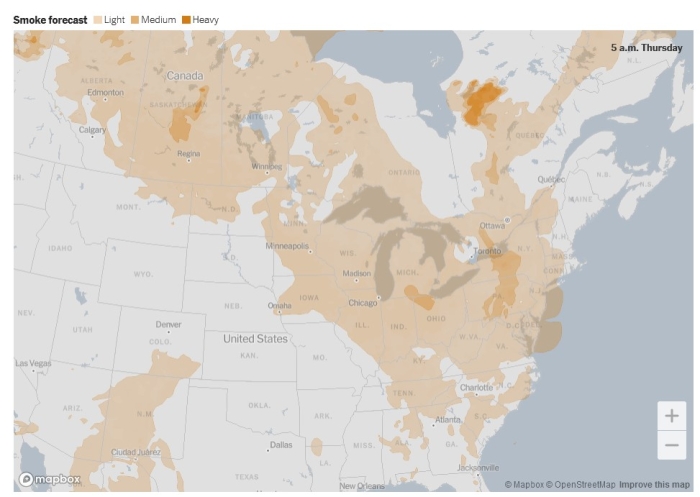Smoke Gets In Your Eye
I am getting a current reading of 160 ppm. Still not good but much better than yesterday's reading at this time.
[Excerpt]
June is often the worst month, said Brendan Rogers, a scientist at the
Woodwell Climate Research Center in Massachusetts who studies boreal
forest fires. Canada is seeing snow that melts out faster in the spring,
he said, allowing for an earlier start to the burning season.
[ . . . ]
“Why is this happening? May was a record warm month across Canada,” said Daniel Swain, a climate scientist at the University of California at Los Angeles. “There are links between record warmth and climate change.”In all 2,305 fires have consumed about 4 million hectares across the country, making it the worst fire season in Canada’s history, according to Prime Minister Justin Trudeau. The resulting thick plumes of smoke pouring south into the US Northeast have created some of the worst concentrations of air pollution in the region since 1999, according to AccuWeather Inc.
Wildfire smoke is a mix of gases and particles from burned trees, buildings and whatever else the flames consume, according to the US Centers for Disease Control and Prevention. It can “make anyone sick,” the agency warned, but people with asthma, pulmonary or heart disease, or who are pregnant, young or elderly are especially vulnerable. Among the symptoms are an elevated heart rate, headaches, wheezing, coughing and fatigue. Paper masks that became a staple during the Covid-19 pandemic won’t filter out wildfire smoke, according to the CDC. N95 and P100 respirators are needed, and the best method is avoiding smoke.
Climate change has spurred on hotter, drier conditions around the world that have lengthened fire seasons in many regions, including California, Europe and Siberia. Changes to the climate have put more energy into the atmosphere, which means severe lightning storms are happening much further north.
When Rogers, the scientist in Massachusetts, first began exploring the tundra he didn’t need safety training for lightning. Now such knowledge is crucial. “The unfortunate part is we are locked in, for some extended time, to continued warming with worsening fire seasons,” he said.
Rogers has found fires increasing across the boreal forests and tundra of Canada and Alaska as snow melts earlier. The blazes cause the permafrost to melt, releasing more greenhouse gases into the atmosphere in a dangerous feedback loop. Black carbon from the fires themselves ends up landing on ice sheets in Greenland, spurring faster melting there.
Climate change has without a doubt added to Canada’s fires this year, Rogers said.
Jaytee said:
I don’t think climate change is something new for the planet. Everything on this planet has changed for millions of years, evolution is a fact, climate change is a fact. We’ve been lucky a big enough meteorite hasn’t hit us in centuries. Wildfire is a part of the evolution, cows burping is a part of the process, dinosaurs farted also, methane is a natural occurrence on this here planet. Things burn, things rise up from the oceans, things erode back into the ocean. It’s us who refuse to accept that the planet wasn’t created specifically for us to live in without the inconvenience of the evolutionary process.
A rock will erode naturally when exposed to water. If a person comes along and aims a high pressure hose at that rock, it will erode faster. If the foundation of your house rests on that particular rock, you may be in trouble.
Re eye itch: saline eye wash, or simple tired-eyes drops from your pharmacy. Make sure they’re gentle drops you can apply 3 or 4 times a day, so you can wash away any teeny particulates caught near your lashes.
Hang in there. Every Australian is feeling your distress, and praying for you. This is our down-wind bushfire haze experience every summer.
joanne said:
Re eye itch: saline eye wash, or simple tired-eyes drops from your pharmacy. Make sure they’re gentle drops you can apply 3 or 4 times a day, so you can wash away any teeny particulates caught near your lashes.
Hang in there. Every Australian is feeling your distress, and praying for you. This is our down-wind bushfire haze experience every summer.
Thanks, joanne. I know you've seen your fair share...
More smoke in the forecast:
The NJDEP issued an Air Quality Action Day for Particulate Matter (PM2.5) for Thursday, June 29th. Levels of fine particulates will rise into the Unhealthy for Sensitive Groups category due to wildfire smoke transport from eastern Canadian wildfires. Sensitive individuals, including those with heart or lung disease, the elderly, and the young should limit strenuous activities and the amount of time active outdoors. KN95/N95 masks may be used outdoors to limit exposure to particulate matter.
Yeah, yesterday was the first day I noticed the smoke get to us. (Cuyahoga Falls, OH) Today too, though I think yesterday was worse.

















The AQI has been getting better throughoutt the day. The sky looks much more normal today. The worst smoke has been shifting to the south. The AQI at points north in NY state are generally better than us now.